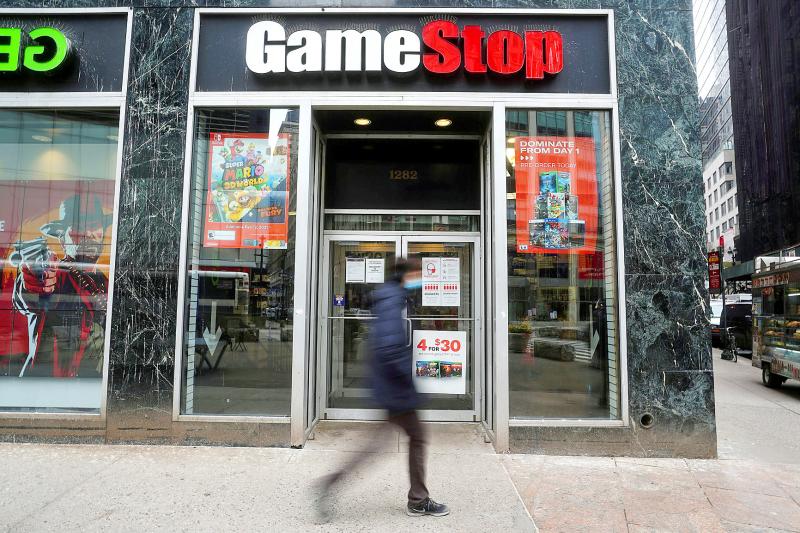GameStop Corp on Thursday plummeted, snapping a dizzying six-day rally and wiping out nearly US$11 billion in market value after brokers choked off demand for the stock by curbing trading on the apps used by the firm’s zealous fan base.
On Thursday, the stock plunged 44 percent after Robinhood Markets, Interactive Brokers Group Inc and others took steps to curtail activity in several high-flying stocks, including GameStop and AMC Entertainment Holdings Inc.
E*Trade Financial Corp is preventing customers from purchasing shares of both firms, a person familiar with the matter said.

Photo:Reuters
GameStop shares on Thursday jumped during extended trading, after Robinhood said that it would allow limited buying of certain securities yesterday.
“We’re beginning to open up trading for some of these securities in a responsible manner,” the firm said in a statement.
GameStop rose 46 percent in post-market trading, while AMC climbed 29 percent.
The video game retailer triggered 19 volatility halts on its way to shedding more than twice what it was worth on Monday.
Volume also fell, with about 55 million shares traded by Thursday afternoon, a far cry from its record of 197 million on Friday last week.
The trading curbs resulted in howls of outrage on Reddit’s WallStreetBets forum, which has been the launching point for many of this week’s blistering rallies.
Robinhood has been hit by lawsuits from customers.
It also prompted lawmakers to criticize restrictions imposed on retail investors.
US Senator Sherrod Brown, incoming chairman of the US Senate Banking Committee, said that he plans to hold a hearing on the “current state of the stock market.”
The clampdown by brokerages extended beyond GameStop to other popular stocks, such as BlackBerry Ltd, that have surged this week, burning short sellers and hedge funds.
The phenomenon attracted the attention of regulators on Wednesday, with the US Securities and Exchange Commission saying that it was monitoring the situation.
“The inability to trade depressed the volume, and high volume is what kept the stock trading at a high level,” Wedbush Securities Inc analyst Michael Pachter said. “I’m actually surprised the trading platforms think they can manage the market this way, and expect they will reverse their decision shortly.”

TECH CLUSTER: The US company’s new office is in the Shalun Smart Green Energy Science City, a new AI industry base and cybersecurity hub in southern Taiwan US chip designer Advanced Micro Devices Inc (AMD) yesterday launched an office in Tainan’s Gueiren District (歸仁), marking a significant milestone in the development of southern Taiwan’s artificial intelligence (AI) industry, the Tainan City Government said in a statement. AMD Taiwan general manager Vincent Chern (陳民皓) presided over the opening ceremony for the company’s new office at the Shalun Smart Green Energy Science City (沙崙智慧綠能科學城), a new AI industry base and cybersecurity hub in southern Taiwan. Facilities in the new office include an information processing center, and a research and development (R&D) center, the Tainan Economic Development Bureau said. The Ministry

ADVERSARIES: The new list includes 11 entities in China and one in Taiwan, which is a local branch of Chinese cloud computing firm Inspur Group The US added dozens of entities to a trade blacklist on Tuesday, the US Department of Commerce said, in part to disrupt Beijing’s artificial intelligence (AI) and advanced computing capabilities. The action affects 80 entities from countries including China, the United Arab Emirates and Iran, with the commerce department citing their “activities contrary to US national security and foreign policy.” Those added to the “entity list” are restricted from obtaining US items and technologies without government authorization. “We will not allow adversaries to exploit American technology to bolster their own militaries and threaten American lives,” US Secretary of Commerce Howard Lutnick said. The entities

Minister of Finance Chuang Tsui-yun (莊翠雲) yesterday told lawmakers that she “would not speculate,” but a “response plan” has been prepared in case Taiwan is targeted by US President Donald Trump’s reciprocal tariffs, which are to be announced on Wednesday next week. The Trump administration, including US Secretary of the Treasury Scott Bessent, has said that much of the proposed reciprocal tariffs would focus on the 15 countries that have the highest trade surpluses with the US. Bessent has referred to those countries as the “dirty 15,” but has not named them. Last year, Taiwan’s US$73.9 billion trade surplus with the US

The Taipei International Cycle Show (Taipei Cycle) yesterday opened at the Taipei Nangang Exhibition Center, with the event’s organizer expecting a steady recovery in the industry this year following a tough last year. This year, 980 companies from 35 countries are participating in the annual bicycle trade show, showcasing technological breakthroughs and market development trends of the bicycle industry at 3,600 booths, the Taiwan External Trade Development Council (TAITRA, 外貿協會) said in a statement. Under the theme “Ride the Revolution,” the exhibition has attracted more than 3,500 international buyers from 80 countries to preregister for the four-day event, which is expected to